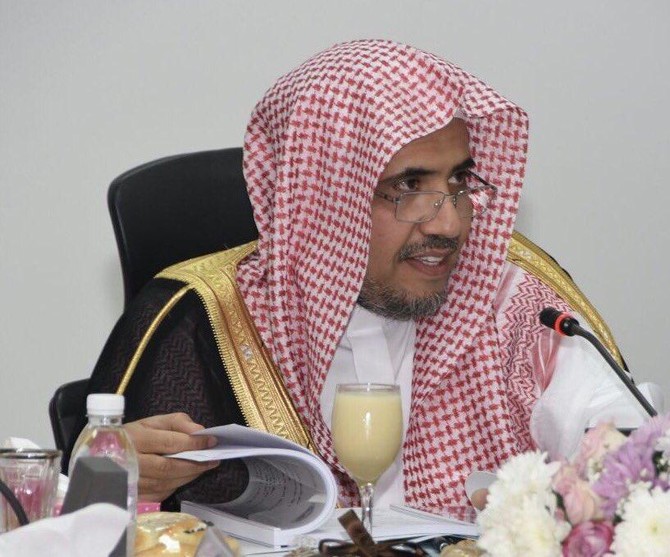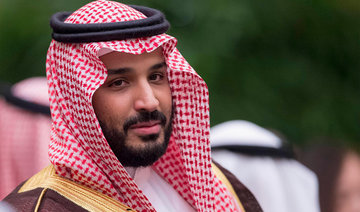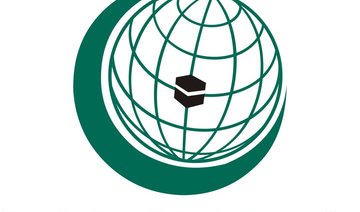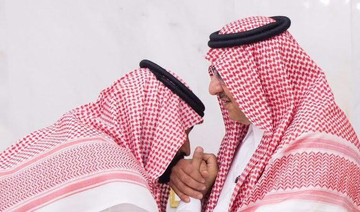JEDDAH: The Muslim World League congratulated King Salman on the appointment of Prince Mohammed bin Salman as crown prince and vice chairman of the Council of Ministers, while continuing in his role as defense minister.
Sheikh Mohammad Abdulkarim Al-Issa, secretary-general of the Makkah-based Muslim World League, described the appointment of the new crown prince as successful and promising given the national and international prestige Mohammed bin Salman enjoys.
In a statement issued Wednesday, Issa said Prince Mohammed bin Salman had always served his religion first, and his country, king and nation second.
Al-Issa hailed the crown prince’s “historic positions and achievements” in carrying out his tasks and responsibilities through his distinguished and valued presence in the national, Islamic, and international spheres.
“The achievements of His Highness are an important addition, which translates the size of the leadership merit of this selection and appointment, which was carried out in accordance with successful procedural arrangements,” he said, adding that Saudi Arabia enjoys a further consolidation of its leading Islamic role and its distinguished international presence.
Dr. Al-Issa explained that the responsibilities entrusted to Prince Mohammed bin Salman had an important and pivotal role in this consolidation.
According to Al-Issa, Mohammed bin Salman’s international communication had a prominent impact, which has been broadly witnessed through his efficiency as a leader and his positive performance on the political system, which benefited the Islamic nation, as well as his successful impact in the economic and development affairs.
Muslim World League congratulates Saudi King on naming new crown prince
Muslim World League congratulates Saudi King on naming new crown prince

King Salman issues royal order to host 1,000 Palestinians to perform Hajj this year

RIYADH: Saudi King Salman has ordered on Monday the hosting of 1,000 Palestinian pilgrims to perform Hajj this year, the Saudi Press Agency reported.
The statement said the King has ordered the “hosting of 1,000 male and female pilgrims from the families of killed or wounded Palestinians” amid the conflict with Israel.
The gesture is part of the Custodian of the Two Holy Mosques’ Guests Program for Hajj and Umrah, which is supervised by the Ministry of Islamic Affairs, Dawah, and Guidance.
The ministry said it immediately began developing a comprehensive plan to facilitate the performance of Hajj for the Palestinian pilgrims.
Saudi Minister of State for Foreign Affairs attends Pope Leo XIV’s inaugural mass

- The pope began his inauguration mass on Sunday, marking the official start of his papacy
- He arrived in St Peter’s Square in the white Popemobile, waving to the crowds
RIYADH: Minister of State for Foreign Affairs and Climate Affairs Envoy Adel Al-Jubeir headed Saudi Arabia’s delegation participating in the inauguration ceremony of Pope Leo XIV, Saudi Press Agency reported on Sunday.
The pope began his inauguration mass on Sunday, marking the official start of his papacy. He arrived in St Peter’s Square in the white Popemobile, waving to the crowds.
The Kingdom’s ambassador to Italy Prince Faisal bin Sattam bin Abdulaziz also attended the mass.
Plan smarter to ‘unlock future prosperity,’ Saudi housing minister says

- Project management leaders gather in Riyadh to discuss best practices in alignment with Vision 2030
- More than 133,000 entities in the Kingdom working on range of construction projects
RIYADH: Project management is “one of the most important drivers of national trust,” Saudi Minister of Municipalities and Housing Majid bin Abdullah Al-Hogail told a conference in Riyadh on Sunday.
Saudi Vision 2030 was created to paint a prosperous future that will reinvent the economic, social, and developmental reality of the Kingdom, Al-Hogail added.
Project management plays a pivotal role at the governmental level by improving the execution and quality control of numerous projects, in full alignment with national goals and targets, he said.
The fourth Global Project Management Forum, with Arab News as a media partner, began its first day of discussions with more than 120 speakers.
The event brings together experts for workshops and dialogue on the best practices in the industry, aligning with Saudi Arabia’s rapid development under Vision 2030.
“Today, we are witnessing accelerating changes and rising challenges … at the heart of (the solutions) is project management to reshape our spaces, meet the needs of the people, and enhance overall sustainability,” said Al-Hogail.
“At the housing and municipality sector, we design projects to meet the dreams of households.”
According to the minister, more than 133,000 entities in the Kingdom are working on a wide range of construction projects.
“This kind of momentum cannot be achieved without project management, which starts with the people and their focus on the conscious planning, flexibility in execution, and ability to adapt to new changes.”
Project management has become smarter, he said, with a strong ability to predict and plan sustainably, and with the potential to help build a strong nation with a diversified economy.
The two-day forum will feature 50 strategic and technical sessions, and include more than 40 exhibitors. A total of 60 agreements will be signed to develop partnerships between entities.
Saudi deputy minister receives Russia, Ukraine envoys

Saudi Deputy Minister for International Multilateral Affairs Abdulrahman Al-Rassi received Ambassador of Russia to the Kingdom Sergey Kozlov in Riyadh on Sunday.
In a separate meeting, Al-Rassi received Ambassador of Ukraine to the Kingdom Anatolii Petrenko, the Foreign Ministry wrote in a post on X.
During the meetings, all sides discussed bilateral relations as well as prominent developments in regional and international arenas.
Riyadh event highlights the role of Saudi museums in the age of social change

- Cultural objectives of Saudi Arabia’s Vision 2030 in focus at three-day event
RIYADH: In recognition of International Museum Day, the National Museum of Riyadh hosted, a cultural event under the theme: “The future of museums in rapidly changing societies.”
The event, organized by the Saudi Ministry of Culture’s Museums Commission, ran from May 15 to 17 and highlighted the role of museums in social change, innovation and youth engagement.
The program included workshops, debates, performances and interactive activities, all aligned with the cultural goals of Vision 2030.
A special session took place with Princess Haifa bint Mansour bin Bandar, president of the Saudi National Committee of the International Council of Museums.
During this open discussion, Princess Haifa emphasized the importance of considering the specific situation of museums depending on their location and level of development. While some institutions demonstrate real dynamism, others are struggling to keep up.
“The efforts to modernize and renovate certain museums are clear. However, other museums face challenges in trying to catch up,” she said.
She stressed the need to revise the legislative framework and encourage private investment to support growth in the sector:
“Our museum system is currently being reviewed, and legislation is needed that encourages investment. Supporting the creation of museums in smaller buildings helps to facilitate funding.”
Regarding the frequent criticisms of so-called “traditional” museums, she offered a more nuanced view.
“There are traditional museums that are changing and remain popular, which proves they still serve the public. Sometimes, traditional museums fail to attract the public, even more so than innovative museums.”
She also referred to the significant transformations underway in the Kingdom, supported by a government body dedicated to the museum sector.
“We are in the midst of a radical transformation with a body entirely dedicated to museums, that supports positive change and offers opportunities for progress.”
As the longstanding head of the Saudi ICOM committee, Princess Haifa reminded the audience that Saudi Arabia is actively involved in international dialogue and decision-making:
“This year, we participated in the revision of a code of ethics established in previous years to recognize what constitutes a museum. We are currently translating certain museological references into Arabic.”
Human resources were another key focus of her speech. She identified several obstacles, especially language barriers and the lack of specialized training.
“The first challenge is the language factor. Frankly, we must acknowledge these issues, particularly the importance of the English language,
“We absolutely need specialized schools, partnerships with universities, training opportunities in our field, and specializations such as museum management and exhibition security.”
Despite the challenges, she expressed optimism, welcoming ongoing partnerships with Saudi universities — particularly in the Eastern Province — and the creation of new professional qualifications.
“This is a diploma that is about to become a master’s degree. Museums are not merely storage spaces; they were designed to be places of restoration and rehabilitation. Today, they have become vital centers offering programs for all segments of society.”
In the context of cultural and social transformation, the ongoing reflection on the role of museums in Saudi society reflects a clear ambition: to transform museums into vibrant, inclusive and forward-looking institutions.
Reporting to the Ministry of Culture, the Saudi Museums Commission is a public body whose mission is to develop, modernize, and supervise museums throughout the Kingdom, whether public or private.
It supports the creation of new museums, promotes heritage, encourages innovation — particularly in the digital space — and fosters cultural education.






















